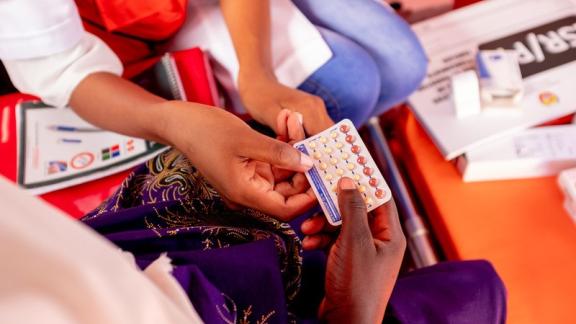Nairobi, 26 September 2020. Today, IPPF Africa Region joins the rest of the world in marking the World Contraception Day 2020.
For over five decades, we have, through our network of over 39 Member Associations (MAs) in sub-Saharan Africa, responded to the contraceptive needs of millions of Africans. Contraceptive products offered through our MA’s static clinics, mobile clinics and community outreach programs have ensured that millions of women and girls have continued access to modern contraceptive options. Through the guidance of our highly skilled and well-trained healthcare workers, women and girls have made informed decisions about the most suitable family planning options for them.
As a result, they have been able to avoid unplanned pregnancies (which may lead to unsafe abortions), and sexually transmitted infections (including HIV). Contraceptives have enabled women to space their children adequately, thus enhancing their quality of life and reducing maternal and infant mortality rates. It has also empowered millions of women and girls, enabling them to pursue their interests such as education and career, as well as business goals. In 2019, we empowered more than 32 million women and girls with Sexual Reproductive Health and Rights information and services in the sub-Saharan Africa Region.
This year however, we mark the World Contraception Day under special circumstances. It comes when the world is reeling from the events of the COVID-19 pandemic. This unprecedented pandemic has caused major disruptions across all sectors including health systems, impacting greatly the access to contraception. Interruptions in supply chains have affected the effective distribution of contraceptive products, with stock-outs being experienced in many countries of sub-Saharan Africa.
The unmet need for contraception is high, and undoubtedly worse during crisis situations. COVID-19 restrictions on movement have hampered women and girls’ access to health facilities for their regular contraceptive appointments. This has called for a change of strategy on the part of our MAs to ensure that women and girls still have access to family planning services. Despite the difficult times, they have ensured that healthcare workers are still available to offer services. Our MAs have also innovated their service and information delivery approaches, which have ensured that contraceptive products reach those who need them.
On this day, IPPF Africa Regional Office and its MAs reiterates the commitment to ensuring that the pandemic does not signify the end of people’s access to contraception, we will ensure to advocate and reaffirm our partnerships with other key players to re-emphasize the need why contraceptives are an essential component of women and girls’ healthcare.
Media Contacts:
-Maryanne Wanyama, Communications Officer, IPPFARO, Nairobi (Kenya) – Email: [email protected]
-Sam Ntelamo, Resident Representative, International Planned Parenthood Federation, Liaison Office to the African Union & UNECA, Addis Ababa (Ethiopia) – Phone: +251 (11) 667 0699/0761 - Mobile +251 (0) 944 73 2051- Email: [email protected]
when
Subject
Yemen









